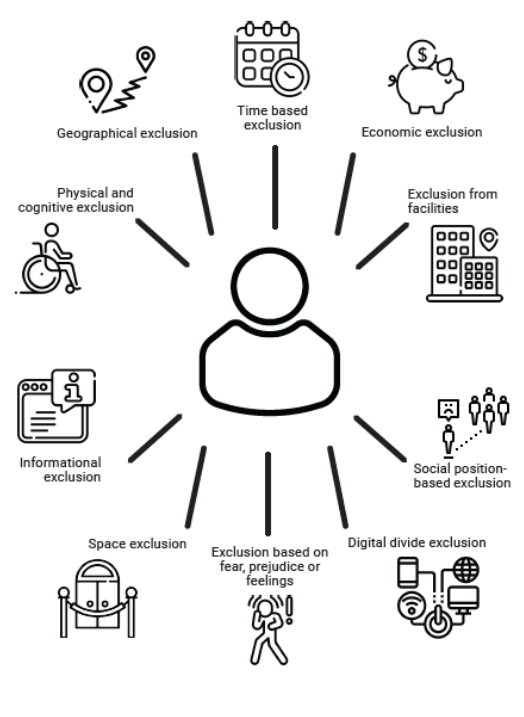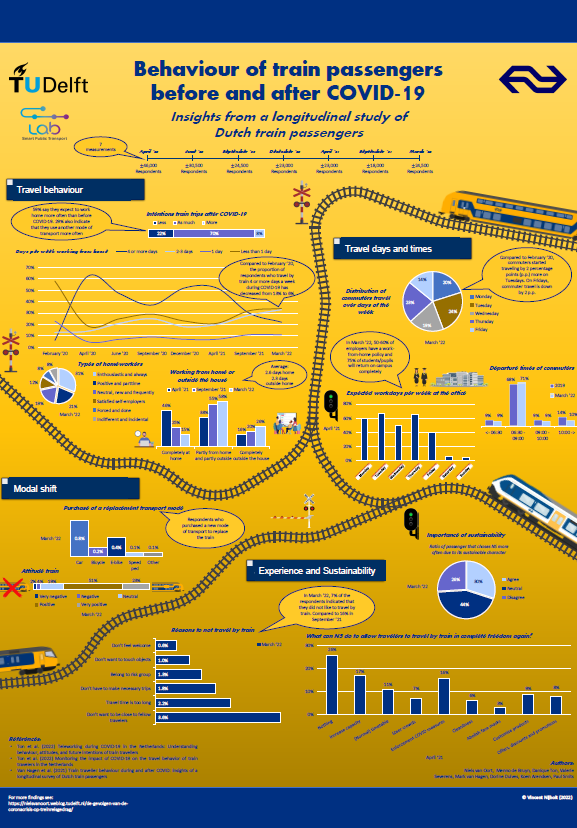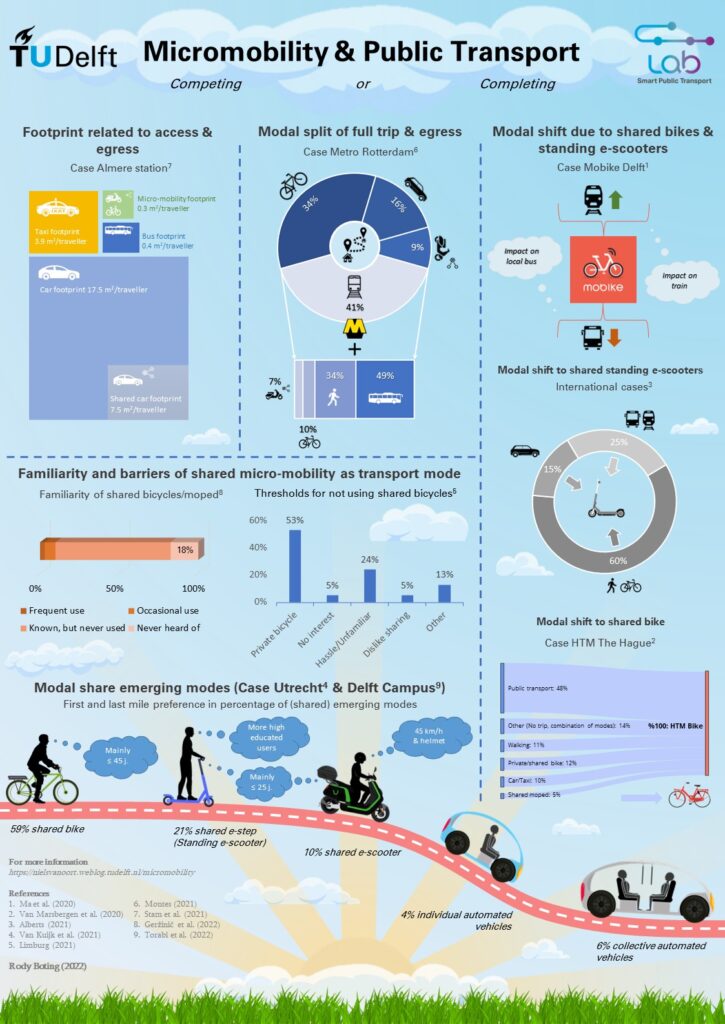Posts in category English
Mobility hubs: Why, who, how?
Mobility hubs are often presented as the solution for enhanced accessibility, a shift towards sustainable mobility and/or improved public space. Sometimes, they seem to be a goal in itself.
In our research, we try to find out how to achieve the mobility, spatial and societal goals by investigating the potential users and their needs, and the required offered modes and facilities accordingly.
The highlights of multiple research projects are presented the infographic below. More details and extra insights are available via the related research papers.

References
- Hoogenboom (2024), Exploiting the benefits of a mobility hub to incentivize shared car usage.
- Montes, A., N. Geržinic, W.V. Veeneman, N. van Oort, S.P. Hoogendoorn (2023), Shared micromobility and public transport integration – A mode choice study using stated preference data, Research in Transportation Economics, Vol. 99, 101302.
- Spierenburg, L., H. van Lint, N. van Oort (2024), Synergizing cycling and transit: Strategic placement of cycling infrastructure to enhance job accessibility,
Journal of Transport Geography, Volume 116. - Van der Meer, T. Leferink, N. Geržinič, J. A. Annema and N. v. Oort (2023), Identifying potential use of emerging neighbourhood mobility hubs using behavioural modelling, 8th International Conference on Models and Technologies for Intelligent Transportation Systems (MT-ITS), Nice, pp. 1-6.
- Van Gerrevink, I., J. de Jong, N. van Oort (2021), Ex-post evaluatie van mobiliteitshubs: Een kwalitatieve studie naar de factoren die het gebruik en de effecten van mobiliteitshubs beïnvloeden. CVS congres Utrecht. (in Dutch; English report)
- Van Kuijk, R.J., G. Homem de Almeida Correia, N. van Oort, B. van Arem (2023), Preferences for first and last mile shared mobility between stops and activity locations: A case study of local public transport users in Utrecht, the Netherlands, Transportation Research Part A: Policy and Practice, Volume 166.
- Vianen, J., N. van Oort, M. Walvius (2022) Een wijkhub voor iedereen? Inzichten in de behoefte aan hubfaciliteiten en deelmobiliteit voor verschillende bevolkingsgroepen. CVS congres Utrecht (in Dutch; English report)
- Xanthopoulos, S., M. van der Tuin, S. Sharif Azadeh, G. Correia, N. van Oort, M. Snelder (2024), Optimization of the location and capacity of shared multimodal mobility hubs to maximize travel utility in urban areas, Transportation Research Part A: Policy and Practice, Volume 179.
Onderzoeksagenda / Research agenda
In het openbaar vervoer is nog maar weinig bij het oude. Ontwikkelingen als elektrificatie, automatisering en deelmobiliteit hebben hun impact op vraag én
aanbod. Behalve vlot en veilig moet het ov ook groen en inclusief zijn. En dan is er de nog altijd voelbare impact van covid-19. Om op dit speelveld de juiste keuzes te maken, heeft het ov nieuwe inzichten en nieuwe tools nodig. Zie hiervoor mijn (geactualiseerde) Onderzoeksagenda.
The world of public transport is changing rapidly. Developments such as electrification, automation, and shared mobility have had an impact on both demand and supply. Besides being smooth and safe, public transport must now also be green and inclusive. And then there is the still tangible impact of Covid‑19. To make the right choices in this evolving landscape, we need new knowledge and new tools. Find my (updated) Research Agenda.
MT-ITS conference: Identifying potential use of emerging neighbourhood mobility hubs using behavioural modelling
Neighbourhood mobility hubs may play an important role in mitigating the impact of passenger cars on climate change and urban public space. As a relatively new concept, academic research on the user potential of neighbourhood mobility hubs is so far limited. This research aims to identify which user groups are likely to adopt services offered by a neighbourhood mobility hub. A survey was distributed in the Netherlands (N=298) and an Exploratory Factor Analysis (EFA) and a Latent Class Cluster Analysis (LCCA) were executed. Four distinctive groups of intended users were uncovered. Two of the clusters have intentions to use neighbourhood mobility hubs. The other two identified clusters do not (yet) intend to use neighbourhood mobility hubs. The clusters indicate that people who currently already travel more by sustainable modes (train or (e-)bicycle) are more likely to be adopters of neighbourhood mobility hubs than the traditional car users. In practice, this may make the positive effect of hubs more limited than anticipated or even increase car use. However it could also facilitate those travelling sustainable to do so for longer as additional shared modes become available to them via hubs. Limitations and directions for further research are discussed.
Read the paper of Van der Meer et al. (2023) HERE
Find the presentation of MT-ITS (2023) in Nice HERE
The full research report is available HERE
More insights into mobility hubs and shared mobility:
10 dimensions of transport related social exclusion
Transport Related Social Exclusion (TRSE) looks at how people who are socially disadvantaged for reasons such as employment status, income, age, or ability, can face limitations in their ability to access transportation services. As income is only one of these factors, people can experience TRSE without having a low income (Yigitcanlar et al., 2018). Rather, social exclusion is defined by an exclusion from economic life, social services, civic life, and social networks (Spoor, 2013). TRSE looks at how elements of the transportation system contribute to this exclusion (Yigitcanlar et al., 2018).
This figure provides an overview of 10 dimensions of Transport Related Social Exclusion, further explained (incl. references) in the position paper of Bruno and Van Oort (2023).

PhD project: Robust train trajectory optimization
In cooperation with the Dutch Railways (NS), Alex Cunillera works in this PhD research on robust train trajectory optimization. Even two trains of the same model running on the same line show significant differences in their dynamics. This might be due to different passenger loads, weather, fault history, driving style of the train driver, etc. Moreover, there are uncertainties in the track data that may also have a strong influence on the train operation. This research focuses on determining the uncertainties and stochastics of these variations and developing methods to compute robust train trajectories that optimize the energy consumption and minimize delays in the presence of the mentioned variations.
Project contributions (ongoing):
Papers:
Train motion model calibration: research agenda and practical recommendations (ITSC 2022)
Presentations:
Real-time train motion parameter estimation using an Unscented Kalman Filter (RailBeijing 2021)
Train motion model calibration: research agenda and practical recommendations (ITSC 2022)
Inclusief openbaar vervoer, van theorie naar praktijk
Hoewel de theorieën over rechtvaardige mobiliteit niet nieuw zijn, missen we nog wel kennis over de implicaties en toepassing. Monica van Luven van het Smart Public Transport Lab deed bij de Vervoerregio Amsterdam onderzoek. “We staan nog aan het begin van goede inbedding van inclusieve mobiliteit in onze beleidscyclus en moeten nog verschillende belangrijke keuzes maken.”
Lees HIER het hele onderzoek
Het 3-jarige onderzoek van TU Delft en Vervoerregio over inclusieve mobiliteit vind je HIER
Ons onderzoek naar de digitale kloof i.s.m. het Kennisinstituut voor Mobiliteitsbeleid vind je HIER
Covid impacts on train travel behaviour
Delft University of Technology and the Dutch railways (NS) started a joint, longitudinal research in April 2020 on Covid impacts on train passenger behaviour. During the pandemic, 7 surveys in different stages (15,000-45,000 participants each) were held to learn about the impacts and expectations. The main results are presented in an infographic.

Find the high resolution infographic HERE. Also available in DUTCH
Find the detailed results in these scientific papers:
Transportion research-Part A: Teleworking during COVID-19 in the Netherlands: Understanding behaviour, attitudes, and future intentions of train travellers
Bivec Transport Days: Train traveller behaviour during and after Covid: insights of a
longitudinal survey of Dutch train passengers
Transport Research Procedia: Monitoring the impact of COVID-19 on the travel behavior of train
travelers in the Netherlands
Find other output such as reports, presentations and media articles
Micromobility and public transport
Following technological and societal developments, new modes and services arrive in our cities. Micromobility solutions, such as shared (e-)bikes and –scooters, are adding new opportunities for individuals, but what their (potential) contribution is to societal objectives such as sustainability, land use and inclusiveness, is not yet known. In order to gain this knowledge and optimize the mobility mix, the Smart Public Transport Lab investigates the demand and supply impacts and interaction of micromobility, including the interaction with public transport. In this infographic the main, recent results of the ongoing research are summarized.

Find more results and details in the related papers and theses:
1. Ma et al. (2020): Bike-sharing systems’ impact on modal shift: A case study in Delft, the Netherlands
2. Van Marsbergen et al. (2022): Exploring the role of bicycle sharing programs in relation to urban transit
3. Alberts (2021): Standing e-scooters, what to expect: micro-mobility with micro effects?
4. Van Kuijk et al. (2022): Preferences for shared modes of local public transport users in the last mile
5. Limburg (2021): Potential for sustainable mode usage amongst car users in mid-sized cities
6. Montes et al. (2023): Studying mode choice in multimodal networks including shared modes
7. Stam et al. (2021): Travellers’ preferences towards existing and emerging means of first/last mile transport: a case study for the Almere centrum railway station in the Netherlands
8. Geržinič et al. (2022): Potential of on-demand services for urban travel
9. Torabi et al. (2022): Passengers preferences for using emerging modes as first/last mile transport to and from a multimodal hub case study Delft Campus railway station
European Transport Conference 2022, Milano
The European Transport Conference (ETC) is taking place this week, September 7-9 2022 in Milano, Italy.
The following Smart PT Lab contributions will be presented:
Change in train travelling behaviour during and after Covid-19 due to anxiety (Presentation and research report)
G.B. Hafsteinsdottir, R. van der Knaap, N. van Oort, M. de Bruyn, M. van Hagen.
Shared micromobility and public transport integration. A mode choice study using stated
preference data (Presentation and research report)
A. Montes Rojas, N. Geržinic, W. Veeneman, N. van Oort, S. Hoogendoorn,.
Understanding the whole station choice concept by cyclists (Presentation and research report)
A Barneveld, R Huisman, N. van Oort.
The full program can be found here:
Podcast Mobility Innovators: Human-centered design for Smart Public Transport
Technology and New mobility are reshaping urban transportation in cities. Human-centric design is key to the quality of life in cities, putting people at the heart of urban transport planning. All stakeholders, including academia, will play a key role to reshape the future of mobility.
Listen to the podcast of Mobility Innovators with Niels van Oort:
04:00 Service reliability in public transport
07:40 About Smart Public Transport Lab at Delft University
14:00 How to run LRT system in the cities efficiently
20:20 Digital Inequality in Transport Services
28:50 Tesla predication on Self Driving Vehicles
34:50 MaaS from the passengers’ perspective
38:30 First & Last miles connectivity
44:54 Use of Big Data to improve services
49:05 Role of academia in the new world
Find more details about the discussed topics here:
Digital inequality (literature review paper)
Service reliability (podcast and papers)
5E model of wider impacts of public transport (book chapter 6, page 112-)
